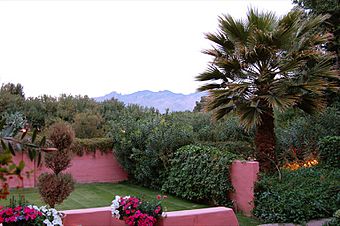Arizona Inn facts for kids
Quick facts for kids |
|
|
Arizona Inn
|
|

Arizona Inn garden
|
|
| Location | 2200 E. Elm St., Tucson, Arizona |
|---|---|
| Area | 6 acres (2.4 ha) |
| Built | 1928 |
| Architect | Merritt Starkweather; James Oliphant |
| Architectural style | Late 19th And 20th Century Revivals, Mission/spanish Revival, Mediterranean Revival |
| NRHP reference No. | 88000240 |
| Added to NRHP | April 5, 1988 |
The Arizona Inn is a famous hotel located in Tucson, Arizona. It was built a long time ago, between 1930 and 1931. A very important woman named Isabella Greenway created it. She later became the first woman from Arizona to serve in the U.S. Congress in 1932. The main building of the hotel was designed by a Tucson architect named Merritt Starkweather. It has a special look called Spanish Colonial Revival architecture, which means it looks like old Spanish buildings.
Contents
Discovering the Arizona Inn's Unique Style
The Arizona Inn is a large place with many buildings. It covers about 14 acres (about 5.7 hectares) of land. There are 25 different structures, and 21 of them are part of the historic area. The buildings are made of pink stucco, which is a type of plaster, and have pretty blue details.
Gardens and Architecture
The hotel buildings are surrounded by beautiful gardens. These gardens also have pink stucco walls. A landscape architect named James Oliphant designed these outdoor spaces. Most of the plants in the gardens are native to Arizona.
Isabella Greenway built a house in 1928 that set the style for the whole hotel. It had stucco walls and a tiled roof. In 1931, six separate homes were built. The main hotel building, with its lobby, dining room, and offices, was finished in 1930. That same year, four small houses called casitas were built, adding 23 rooms. The next year, five larger villas were added, with 36 rooms. A swimming pool and two other buildings were added in 1937.
Inside the Hotel
Inside the Arizona Inn, the walls are mostly plain white. Arches connect the main rooms, making them feel open and grand. Some dining and meeting rooms have special themes. For example, the Catlin Room displays prints by an artist named George Catlin. The African and Safari Rooms have souvenirs from Isabella Greenway's trip to Africa in 1931.
The Arizona Inn is considered a very important historical place. It was added to the National Register of Historic Places on April 5, 1988. Today, it still operates as a special boutique hotel.
The Story of Potter Place
Across the street from the Arizona Inn, there's a small street called Potter Place. This name comes from Dickson and Sue Potter. They started a special school for girls called the Potter School.
How the School Began
The Potters were from New York. They started spending winters in Tucson, Arizona because their son needed a warmer climate for his health. While in Tucson, they got the idea to open a girls' school. After their first school year, they bought an old house across from the Arizona Inn. This house became the main building for their school. The property also had a large swimming pool, which students used often. The Potters also built a few other buildings and a house for themselves on the property.
What Students Learned
Students at the Potter School studied many subjects. These included Latin, drama, history, math, French, music, art, science, and English. They could also take a two-year course on the Bible. If students made special arrangements, they could learn Spanish and German too.
The school offered individual swimming and tennis lessons. Sometimes, students who showed "good citizenship" were allowed to go on ski trips to Mount Lemmon.
Potter Ranch and Its Legacy
In 1945, Dickson Potter bought more land along North Craycroft Road. This was north of the old Fort Lowell. He built a ranch house and stables there, which became known as Potter Ranch. At the ranch, students received riding lessons from a master rider. The school also held annual horse shows. These shows featured horse jumping for both new and experienced riders. Winners had their names engraved on the Bob Locke Award. Today, the Potter Ranch is home to The Gregory School.
The Potter School closed in 1953. Its buildings were sold to a Catholic group called the Sisters of Charity. The main house of the school was torn down in 2015.
See Also
Images for kids
 | Aurelia Browder |
 | Nannie Helen Burroughs |
 | Michelle Alexander |




